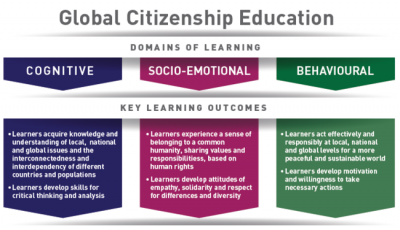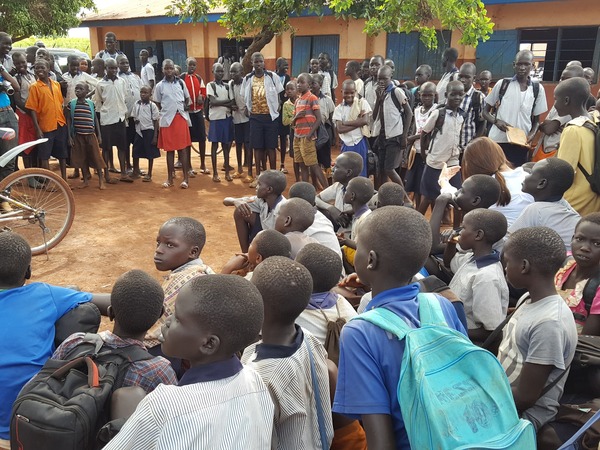WHAT is Global Citizenship?
There are different interpretations of the notion of ‘global citizenship’. A common understanding is that it is a sense of belonging to a broader community, beyond national boundaries, that emphasizes our common humanity and draws on the interconnectedness between the local and the global, the national and the international.
The term “Global Citizenship” is not new. It has gained significant momentum with the realm of development since the launch of the UN Secretary-General’s Global Education First Initiative (GEFI) in 2012, which has identified “fostering global citizenship” as one of its three priority areas of work, along with access to and quality of education.
For UNESCO, global citizens are individuals who think and act for a more just, peaceful and sustainable world.
WHAT is Global Citizenship Education (GCED)?
Global Citizenship Education aims to equip learners of all ages with those values, knowledge and skills that are based on and instill respect for human rights, social justice, diversity, gender equality and environmental sustainability and that empower learners to be responsible global citizens. GCED gives learners the competencies and opportunity to realize their rights and obligations to promote a better world and future for all
GCED builds on many related fields such as human rights education, peace education, education for international understanding and is aligned with the objectives of education for sustainable development (ESD)
What is Global Citizenship Education (GCED)?
This refers to a way of understanding, acting and relating one’s self to others and the environment, based on universal values, through respect for diversity and pluralism.
The core themes of GCED are tailored around the culture of peace
- Peace
- Human Rights
- Globalization
- Cultural Diversity
- Sustainable development
What is 21st Century?
This is a global era influenced by a lot of science and technology. There are many global challenges including over population, climate, wars, refugees and the list is endless that require combined efforts to solve.
UN System – UNESCO
The United Nations is trying to create an alternative world with its various missions and strategies like MDG’S and SDG’s that require combined efforts to be achieved.
The most important goal is the SDG number four (4)-which is ‘quality education’ that UNESCO is committed to achieving through various initiatives.
APCEIU: Asia Pacific Center of Education for International Understanding.
APCEIU is UNESCO Category II center established in 2000 by the Agreement between UNESCO and the Government of the Republic of Korea, being mandated to promote Education for International Understanding (EIU). This is being done through a number of processes and initiatives listed below;
- Capacity Building for Educators.
- International Teacher Exchange Programme
- EIU/GCED Research and Development of Materials
- Research and Policy Development Programmes on GCED (2016)
What Is GCED Online Campus?
- An e-learning platform on GCED
- For teachers interested in learning and teaching about GCED
- Provides GCED online courses and a wide range of GCED-related teaching &learning materials
Reasons for establishing GCED Online Campus
- To enhance teachers’ understanding of GCED from anywhere in the world
- To encourage and help teachers to promote GCED in real educational settings
- To contribute to Learning to Live Together
Based on the above topics, age-specific learning objectives and key themes have been suggested corresponding to age groups/level of education.
- Pre-primary-5-9 years
- Upper primary- 9-12 years
- Lower secondary- 12-15 years
- Upper secondary- 15-18 years
Areas that GCED seeks to address include
- Global citizenship
- Human rights and civic responsibilities
- Environmental sustainability
- Peace and conflict resolution
- Cultural diversity
- Interdependence
- Climate change
- Gender equality,
Strategies to Promote GCED
- Technical Consultation on GCED
- GCED Clearing house Website (www.gcedclearinghouse.org)
- Publications on GCED
The following are the countries selected to spearhead the implementation of the GCED;
Cambodia, Colombia, Mongolia and Uganda
Some of the Institutions already implementing GCED in Uganda
- Uganda National Commission for UNESCO (UNATCOM)
- United Nations Children’s Fund (UNICEF)
- British Council Connecting Classroom
- Indian Cultural Foundation
- Uganda Cultural Heritage Foundation
- Human Rights Network Uganda (HURINET-U)
- Global Peace Foundation
WHAT is UNESCO’s vision of GCED?
UNESCO’s commitment to GCED is anchored in its unique vision of peace that is itself grounded in the belief that lasting peace is more than security and freedom from violence. As stated in UNESCO’s Constitution, “since wars begin in the minds of men and women, it is in the minds of men and women that the defenses of peace must be constructed.”
This vision of lasting peace requires a commitment to four types of learning – often referred to the “four pillars of education” :
• “Learning to know”,
• “Learning to do”,
• “Learning to be”,
• “Learning to live together”.
Learning to live together means “developing an understanding of other people and an appreciation of interdependence – carrying out joint projects and learning to manage.
GCED can be implemented through Formation of clubs like:
- Interactive club
- Patriotism club
- Music Dance and Drama club
- Debating club
- Cultural club
- Environmental conservation club
- Young farmers club
- Students councils
- Scouts and girl guides
- Games and sports activities
Participation of all stakeholders e.g.
- Students,
- Parents,
- Teachers and
- Support staff at schools
- Institutional administrators (principals, head teachers).
- Social partners and local community.
- Consensus building
- The development of curricular guidelines GCED
- Preparation of relevant learning materials
- Developing self-evaluation tools for schools.




